Observatory of Prostitution report on World Cup sex tourism in Rio
I am honored to be working as a research collaboration with Rio’s Observatory of Prostitution, an extension project of the Metropolitan Ethnographic Lab – LeMetro/IFCS-UFRJ at the Federal University of Rio de Janeiro, which includes the participation of Soraya Silveira Simões, Thaddeus Blanchette, Ana Paula da Silva, Greg Mitchell, Laura Murray, who have been invaluable in orienting my work in Rio de Janeiro’s red light district.
The Observatory of Prostitution seeks to monitor the impact of World Cup on sex workers in Rio de Janeiro and other host cities. In our first report, covering the first two weeks of World Cup, we have found that business is down for sex workers across most of Rio de Janeiro, and the closure of two popular venues in Copacabana Beach has caused security concerns and increased violence among some sex workers.
You can download our June 28 report in English (link) and Portuguese (link); accompany our work at https://www.facebook.com/observatoriodaprostituicao; and contact us at observatoriodaprostituicao@gmail.com. This release is also available in Portuguese at http://www.umbeijoparagabriela.com/?p=3234.
Featured image of the plaza next to Balcony Bar courtesy of Matias Maxx; all other photos courtesy of the Observatory of Prostitution.
OBSERVATÓRIO DA PROSTITUIÇÃO
LeMetro/IFCS-UFRJ
June 28, 2014
Who We Are
The Observatory of Prostitution is an extension project of the Metropolitan Ethnographic Lab – LeMetro/IFCS-UFRJ, which unites professors, researchers and students of the Federal University of Rio de Janeiro-UFRJ, the Gender Studies Center PAGU from the State University of Campinas-UNICAMP, and the Fluminense Federal University-UFF. The project is conducted in partnership with ONG Davida – Prostitution, Civil Rights and Health; the Brazilian Interdisciplinary Association of AIDS-ABIA; the Public Archive of the State of Rio de Janeiro-APERJ and the Brazilian Network of Prostitutes.
About the Project
For each of the 32 days of World Cup Brazil, the Observatory of Prostitution is conducting ethnographic research in the principal zones of prostitution in Rio de Janeiro (Copacabana Beach, Ipanema Beach, Centro, Lapa and Vila Mimosa), and host cities Fortaleza, Recife, São Paulo and Brasilia, in order to monitor the impact World Cup has in areas of prostitution in certain regions of these cities for the presence of foreigners; and to monitor the actions of police, governmental organizations and NGOs that are working in these areas either to combat the sexual exploitation of children or to promote their policies concerning sex work. Our research also aims to observe the working conditions in these areas during World Cup and the networks formed to facilitate sex work during this period, in addition to keeping track of national and international news on prostitution in Brazil during World Cup.
During the last week of games (July 7-13), the Observatory of Prostitution will administer a short survey with sex workers contacted during the length of our research to evaluate their experiences during World Cup. Part of our work during World Cup will also be to provide bi-weekly summaries of the preliminary results of our research to the broader public, including our partners and the press.
To accompany our work online, please visit: https://www.facebook.com/observatoriodaprostituicao
Preliminary considerations of the first two weeks of World Cup in Rio de Janeiro: June 12-26, 2014
1. The closure of Balcony Bar and Hotel Lido inaugurated the establishment of a “state of exception” designated to function during the realization of these mega-sports events.
On June 12, the opening day of World Cup, Rio police and press arrived at Balcony, a bar and restaurant popular with tourists and sex workers, and the nearby Hotel Lido in Copacabana Beach’s Lido Plaza, first to close the establishments under charges of child sexual exploitation, and then to film the operation with GloboTV. This was one of the most important events in Rio de Janeiro on the opening day of World Cup.
According to The Public Ministry of the State of Rio de Janeiro, “the conduct [of Balcony Bar] reinforces a derogatory image of Brazil, which is viewed internationally as a country that permits sexual tourism.” This statement indicates that the biggest fear of government officials is the supposed perception of their country, to the detriment of the rights of citizens in a country where prostitution has never been a crime.
Prostitution is legal, and it is important to highlight that Brazil also does not have laws against sexual tourism between consenting adults. It is also worth noting that as of now, the Public Ministry has yet to offer any evidence that either of the establishments in question were in fact involved in any illegal activities, and that no one to date has been arrested in connection with either case. Nonetheless, both establishments remain closed.
A large police presence in the area remains, particularly in front of Balcony Bar on the Copacabana Beach waterfront overlooking the FIFA Fan Fest, and in a few bars bordering Lido Plaza. We have not observed police harassing any sex workers in this area during World Cup, as indeed they shouldn’t.
2. The closures of Balcony Bar and Hotel Lido have not affected the number of sex workers and clients in the immediate area.
The closure of these establishments on the opening day of World Cup carries undeniable symbolic weight in terms of repression against sex workers, but has only resulted in restricting the area in which women can work safely, pushing the flux of sex workers and clients to the adjacent plaza, streets and sidewalks. A number of older nightclubs in the area that had lost their clientele to newer venues have returned to receive a large number of clients, and we have observed lines of clients in front of venues Barbarella and Cicciolina.
The closure of these two establishments in Copacabana Beach has generated controversy among sex workers in the vicinity. Some consider the accusations of sexual exploitation of minors against the owners of the establishments unfair. Others affirmed that the prices at both establishments were abusively high, and that clients would end up spending much of their money at the bar instead of on them. Now, according to women we spoke with, clients are negotiating prices with sex workers in the plaza without having to sit down for food or drinks, which is permitting sex workers to do more work and at a higher price.
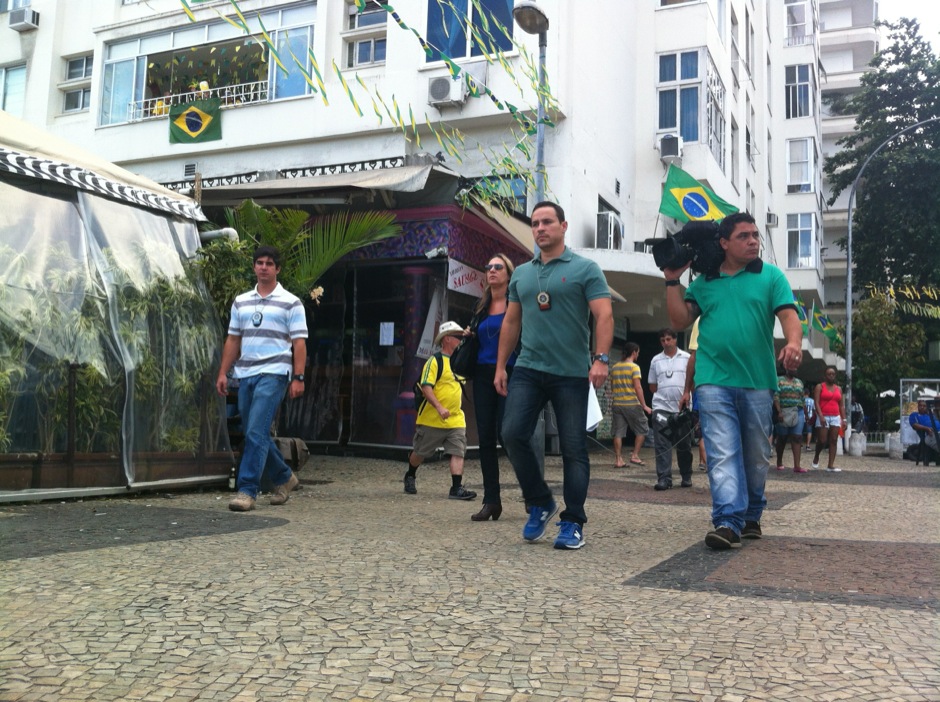
Civil Police from Rio’s Tourism Department arrive at Balcony Bar with GloboTV to announce its closure – June 12, 2014
3. Sex workers have reported increases in violence and robbery since Balcony Bar and Hotel Lido closed.
We have recorded narratives of how the closure of Balcony Bar and Hotel Lido has decreased security for sex workers in the area and exposed them to situations of violence. Luana (fictitious name) relates:
Before I’d only go to Hotel Lido with clients, but wouldn’t take them back to my apartment. Lido has a doorman and security cameras in the hallways, and there are a lot of police nearby. Now that we’re taking clients to our apartments a lot more of us are being assaulted and robbed, a lot more of us…. They take the women to the corner, say that they are going to do the trick in a hotel, and when they get to the corner they assault them.
Luana relates a situation of violence she experienced the night before she gave this interview:
I went to do a program [sexual engagement with a client] in the house of a Chilean who was using cocaine. He offered it to me, but I said I don’t use drugs while I am working, and he was not satisfied. Before I had finished putting my clothes back on he took my money back and threw me out of his apartment! My heel got stuck in the door and when I pulled my leg out I almost broke it.
4. The number of sex workers in Rio’s South Zone (including sex venues in Copacabana and Ipanema beach) roughly doubled in the first two weeks of World Cup.
Along with Maracanã stadium, Copacabana is one of the principal areas of World Cup activities in Rio and host to the FIFA Fan Fest, where thousands of fans can watch World Cup games for free on a big screen installed on Copacabana beach. The activities of tourists are largely concentrated in this area, and when they look for sex workers, they are looking nearby.
This may be due to the lack of knowledge among tourists potentially interested in prostitution that there are hundreds of other sex venues scattered across Rio de Janeiro; or to the contrary, the increase of their sense of security in these highly policed areas; the type of Brazilian woman and environment that the tourists imagine and seek; and their reduced budget for other activities and transportation to other areas of the city.
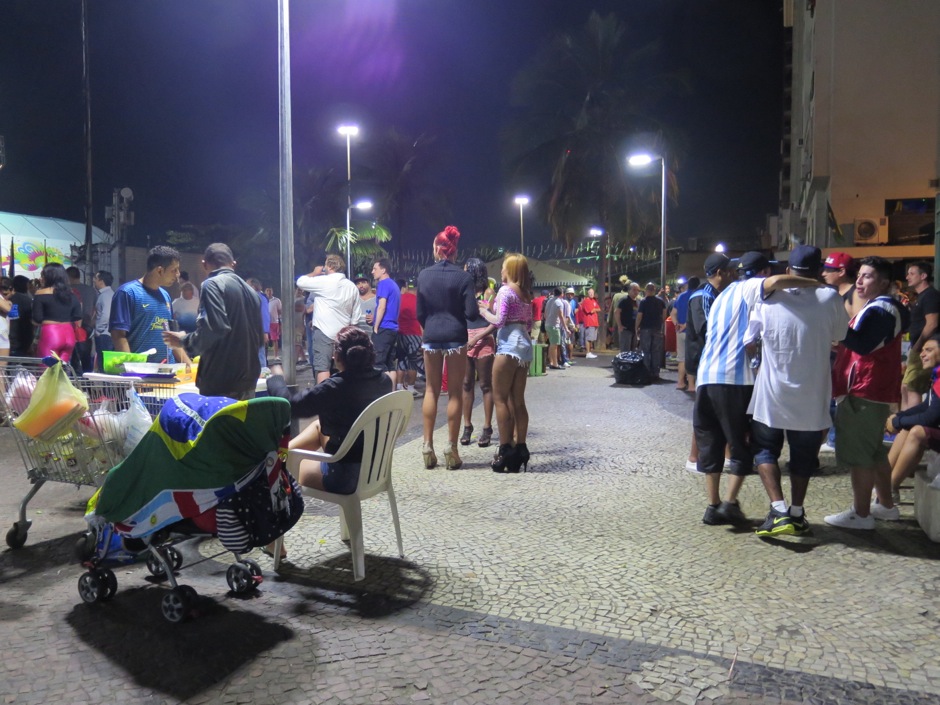
The plaza next to Balcony Bar two weeks after its closure.
5. Prostitution in the other regions of Rio de Janeiro has significantly declined during World Cup.
Among 279 sex venue addresses we mapped in the city of Rio de Janeiro before World Cup, only 16 have demonstrated an increase in sex workers and tourists, and we have observed a decrease in business in most of them.
There are several possible and more evident reasons for this decline in Rio’s sex market at precisely the time an influx of tourists has arrived, including the fact that tourists are concentrated in particular parts of the city, and commerce in downtown has slowed due to the large number of holidays Rio has had during the first part of World Cup. World Cup has completely disturbed the work calendar in Rio de Janeiro, since game days in Rio and also days the Brazilian selection plays have been declared holidays. In other words, the city is exclusively operating around World Cup activities. As a result, sex workers operating in the downtown area of Rio, particularly in Vila Mimosa (the red light district) and in small saunas and clubs downtown, have faced a significant decline in the number of clients for the first two weeks of World Cup. We have observed venues in downtown Rio and Vila Mimosa who have voluntarily shut their doors due to lack of business.
This reduced client flux has led some women who generally work in these areas to migrate to sex zones in Rio’s South Zone: Ipanema, and above all, Copacabana, where they hope to find tourists. One woman we spoke with said that she was working on the street in Copacabana to recuperate her lost revenue from the sauna she normally works in downtown Rio. She also expressed that she didn’t like working on the street and was demonstrating caution, and avoided working with a drunk client.
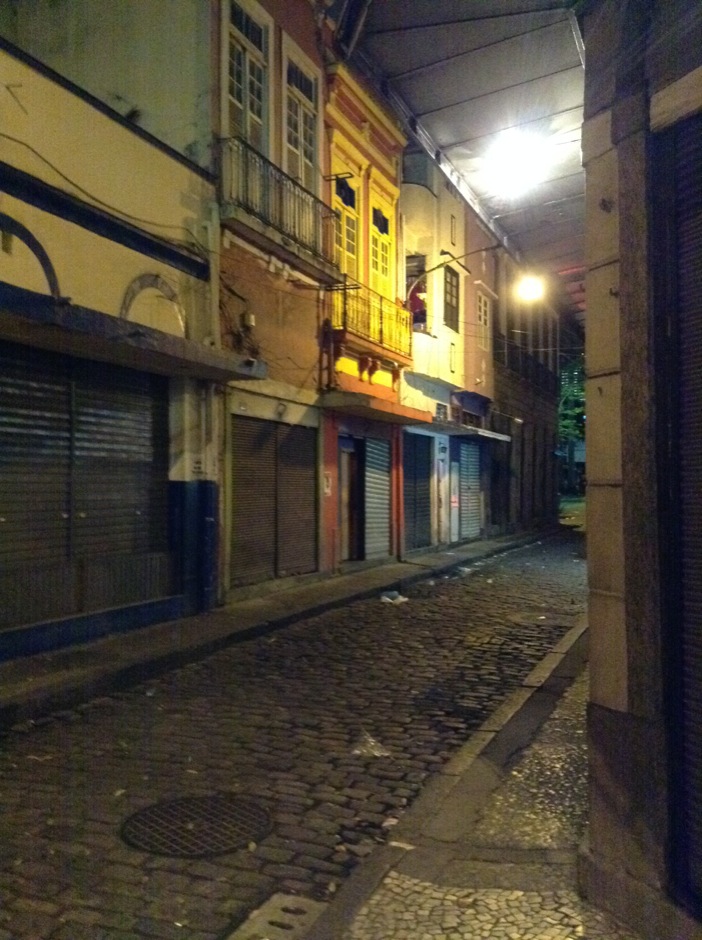
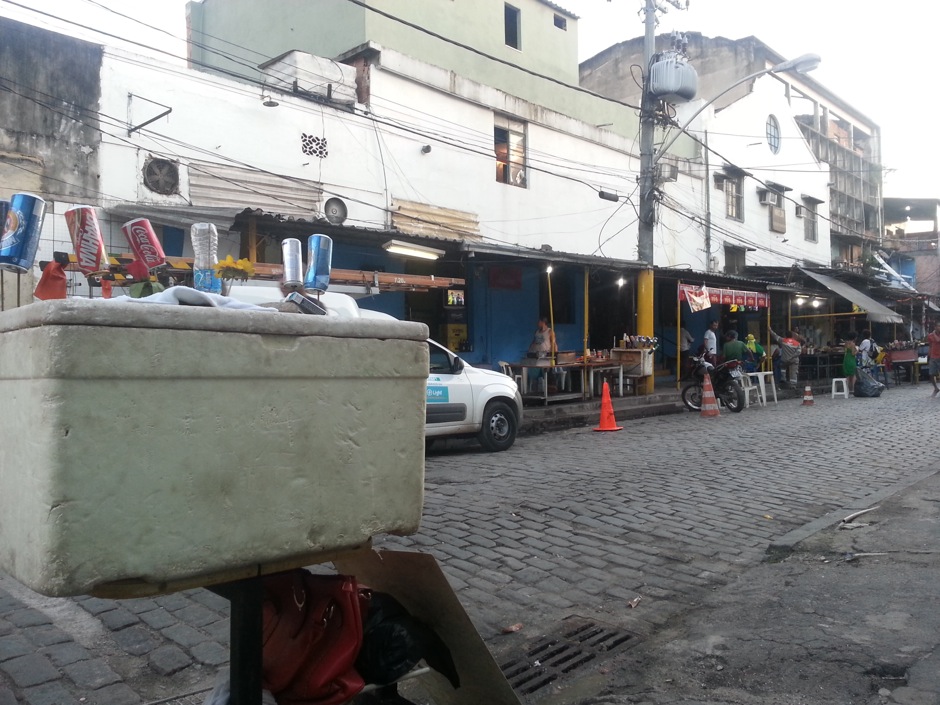
Closed doors at sex venues in Downtown Rio de Janeiro; an empty Vila Mimosa on the opening day of World Cup.
6. The demand for prostitution has not increased among tourists in Copacabana.
80% of anticipated World Cup tourists are Brazilians traveling within their own country, and already have access to the legal sex industry in the cities they are coming from. The majority of foreign tourists we have observed in Rio so far come from other Latin American countries, and do not have a large amount of disposable income available. The presence of North Americans, Brazilian tourists and Europeans increased slightly in sex venues in the South Zone, but less than these zones normally experience during high seasons, including Carnaval and New Year’s.
Meanwhile, the offer of sex has expanded as more sex workers have arrived in the South Zone from other parts of Rio. Sex workers who usually work in dispersed locations in the almost 300 sex venues comprising Rio’s sex industry are competing for clients in concentrated areas of one part of the South Zone, and they are interspersed with women and men willing to have sex with tourists who are not necessarily sex workers.
7. Prices of programs with clients are falling in the South Zone, and sex workers are complaining about the difficulty of finding clients willing to pay their stipulated price.
Sex workers are describing their negotiations with clients as strenuous, a clear sign that supply is greater than demand. One sex worker commented: “Last night in Vila Mimosa the girls said it was full of gringos, but none of them had money and didn’t want to pay enough.”
8. Gay male prostitution in Rio de Janeiro is also suffering a large decline during World Cup, principally due to the heteronormative reputation of international football.
Conclusions
As of June 26, our research indicates that there has yet to be an increase in prostitution and sex tourism in Rio de Janeiro due to World Cup, as the media and government organizations have predicted. What is happening instead is a concentration of sex workers in a single sector of the city. Tourists are largely going to the same sex venues tourists usually go to, principally in Rio de Janeiro’s South Zone.
Among 279 sex venue addresses mapped in the city of Rio de Janeiro before World Cup, only 16 have demonstrated an increase in sex workers and tourists. All of the other points in the city are practically empty, with women complaining about the loss of clients and income during World Cup.
As of now, we have no knowledge of any new sex zones that have arisen during World Cup. We have also not encountered any sex workers who traveled to Rio de Janeiro specifically to work during the mega-event. This may be in part due to the dispersed nature of World Cup, with a dozen host cities across Brazil. Before the games, we spoke with sex workers from other parts of Brazil who said they planned to return to their cities of origin precisely because they thought these areas would be more profitable than Rio during World Cup.
Researchers
This report was composed with the collaboration of the following researchers of the Observatory of Prostitution in Rio de Janeiro: Soraya Silveira Simões, Thaddeus Blanchette, Ana Paula da Silva, Greg Mitchell, Laura Murray, Aline da Cunha Valentim, Amanda De Lisio, Riane De Sa, Lucas Bernardo Dias, Amanda Neder Ferreira, Dayane Gomes, Flavio Lenz,Riane Martins, José Miguel, Débora Santana de Oliveira, Andressa Raylane, Julie Ruvolo, Yaa Sarpong, Marlene Teixeira and Gonçalo Zúquete.
An important note about terminology: sexual exploitation, sex trafficking and prostitution
The researchers associated with the Observatory of Prostitution are against the sexual exploitation of minors and the trafficking of persons. However, we think it is important to differentiate between these concepts. First, the sexual exploitation of minors and the trafficking of persons should not be confused with the activities of adults exercising free will and consenting to prostitution, whether they are Brazilians or foreigners. Paid sex between consenting adults is legal in Brazil, whether it’s with Brazilians or foreigners. Considering that the United Nations and the National Tourism Organization define sexual tourism as an activity realized by “people who use the infrastructure of tourism to travel to foreign countries and involve themselves in commercial sexual relationships with local residents,” this signifies that sexual tourism in Brazil is not illegal.
Commercial sex with people younger than 18 years old is not considered sexual tourism – it is the sexual exploitation of minors, and it is a crime in Brazil, whether practiced by Brazilians or foreigners. Similarly, forcing someone to involve themselves in sexual activity is not sex tourism or prostitution; it is rape and/or sexual exploitation.
The Brazilian government has never published coherent statistics on the number of cases of sexual exploitation that have involved foreign visitors in Brazil. Data obtained from Disque 100, Brazil’s federal hotline to report sexual exploitation, indicates that the number of these cases is relatively small. In a report published by the Secretary of Human Rights in 2008, of 6,817 calls reporting the sexual exploitation of children or adolescents reported to Disque 100 from 2003-2007, only 47 (0.7%) involved “sex tourism,” denouncing the involvement of foreign tourists. Considering that Disque 100 registered 67,104 cases of violence against children and adolescents during this same period – of which some 16,500 were cases of sexual violence – the available evidence indicates that Brazilians conduct the large majority of acts of sexual aggression against Brazilian children and adolescents.
This data is even more worrisome when we consider a 2004 investigation by Brazil’s National Congress into the sexual exploitation of minors. Of 79 cases cited as “exemplary” for this study, only three involved foreign tourists. Fourteen cases involved government officials from the municipal to federal level; eight involved police, judges or other law enforcement agents; and five cases involved religious leaders. Thus we believe that the outcry against the supposed threat of “sex tourism” detracts the public’s attention from the real threats that Brazilian children face and contributes to the government focusing resources and attention on temporary operations against prostitution, and not on projects aiming to effectively reduce the abuse and exploitation of children and adolescents in Brazil.
www.observatoriodaprostituicao.wordpress.com
LeMetro-Laboratório de Etnografia Metropolitana
Instituto de Filosofia e Ciências Sociais
Universidade Federal do Rio de Janeiro
Largo de São Francisco de Paula, nº 01, Sala 417, Centro,
Rio de Janeiro, Cep: 20.051-071 – RJ
Brasil
(00-55-21) 2221-7539
(00-55-21) 2622-3856
Email: observatoriodaprostituicao@gmail.com

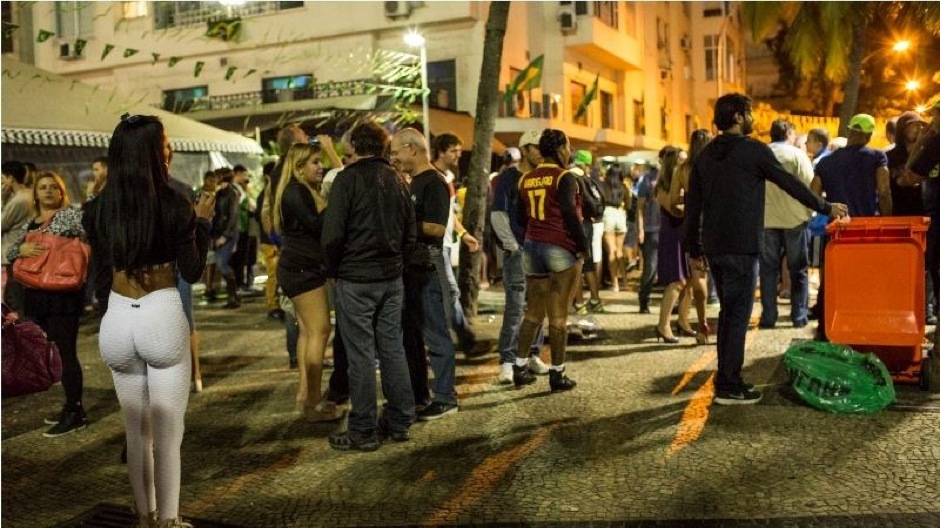


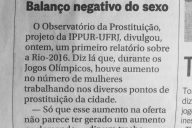

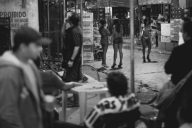
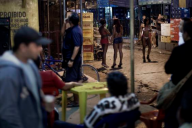

[…] [Aqui compartilhamos o release do Observatorio da Prostituição sobre a pesquisa que vem desenvolvendo sobre os feitos da Copa do Mundo em contextos de prostituição. Vc pode baixar o relatório completo do Observatório em pdf em português aqui ou em inglês aqui. A tradução em inglês também está no blog em inglês e no Red Light Rio.] […]
[…] 16 have had better business during the World Cup, according the research published in the recent report. Rio’s sex trade workers expected business to be booming during the month-long event; some […]
[…] to our findings at the Observatory of Prostitution, sex workers in Vila Mimosa and Rio’s downtown district […]
[…] Ridder, Soa AIDS, Nederlands and the other speakers are Janine Ewen and representatives from the Prostitution Observatory of the Federal University of Rio de Janeiro and the Davida Prostitutes Rights […]
[…] Ridder, Soa AIDS, Nederlands and the other speakers are Janine Ewen and representatives from the Prostitution Observatory of the Federal University of Rio de Janeiro and the Davida Prostitutes Rights […]